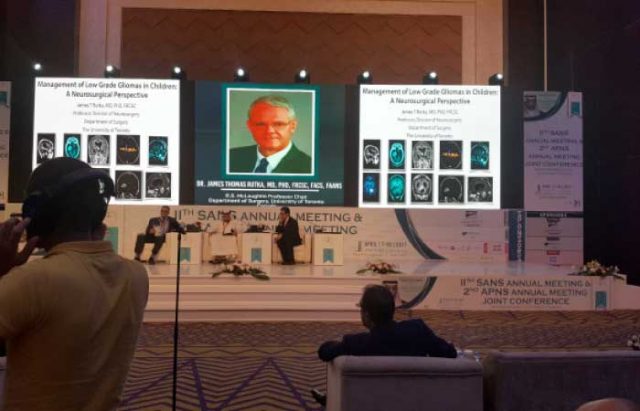
KSA ‘on a par with the West’ in use of technology in neurosurgery
Saudi Arabia is one of the most advanced countries in terms of neurosurgery using technology, according to a senior expert in the field.
“We use intraoperative imaging, all micro techniques, advanced equipment and instruments that many countries in the west do not have,” said Dr. Mahmoud Al-Yamany, a consultant neurologist and CEO of King Fahd Medical City (KFMC), in Riyadh.
Al-Yamany was talking to Saudi Gazette on the sidelines of the 11th Saudi Arabia Neurosurgical Society (SANS) and Arab Paediatric Neurosurgical Society (APNS) joint conference held in Riyadh from April 7 to 10. The conference was titled “Invention, Innovation and Technology Transfer.”
“This annual meeting of neurosurgeons from Saudi Arabia with international experts help lift the practice of neurosurgery in general and identify areas we can improve in neurosurgical practice. It also helps identify certain techniques that we may or may not need,” Al-Yamany said.
“This is done on a scientific basis, so it is more of presenting scientific papers that were published or about to be published on new technologies to overcome certain problems or to enhance the practice of neurosurgery in general,” he added.
He said Saudi Arabia particularly focused on building human capabilities. “The successful use of advanced technology in Saudi Arabia was nothing but a result of long training of Saudi neurologists in international programs that brought the know-how and the technical skills to the country,” Al-Yamany said.
“When it comes to techniques to treat or manage brain traumas or advanced vascular malformation or spine injuries, we are always considered equivalent to western Europe and North America. … The challenge we have is how to prevent head injuries. It is our obligation as neurologists to increase awareness among the public of the consequences of head injuries. We should focus on reducing injuries rather than the burden of treating the injuries,” he said.
He concluded by saying that such conferences would not cause a sudden rise in awareness. “However, through exchanging knowledge, the world can witness little enhancements in quality. Over the years, it will improve the overall practice. Adding the two elements together the experts, who have seen all types of complications and injuries that teach them how to avoid such complications, can improve technology that would allow neurologists to conduct surgery safely,” he said.
“The changes that will come in this field soon would further improve quality of performance and output. What we have in Saudi Arabia in the majority of centers is comparatively of excellent quality but we do not have sufficient volumes. The reason is that we tend to do more of quality oriented work than volumes. I believe, we must strike a right balance because at the end of the day, it all revolves around economy and in economy you cannot keep on improving quality without improving the volume,” he added.
Saudi Gazette also met with Dr. Pablo Recinos, an internationally recognized neurosurgeon at Cleveland Clinic, to talk about his participation in the conference. “What I do is surgery at the base of the skull, which is a hard place to reach generally. It revolves around technology to get good outcomes. For example, we have neuronavigation, which is like a GPS system for brain surgery that helps us confirm that we are in the specific delicate area we wanted to reach,” he said. He emphasized that it is hard to say the percentage of risk reduced by the use of technology. “Technology reduces risks but the percentage varies depending on each situation,” he said.
Dr. Hubert Fernandez, one of the global experts on movement disorders who works at Cleveland Clinic, said they wanted to cultivate a relationship with the Gulf region in general and especially with Saudi Arabia in terms of exchanging information and being updated with best world practices through education, training, or attending conferences to present scientific papers that can benefit all parties. “It is hard to grow technology on your own. All parties must exchange expertise and share their experiences to ensure mistakes are not repeated,” he said.


























